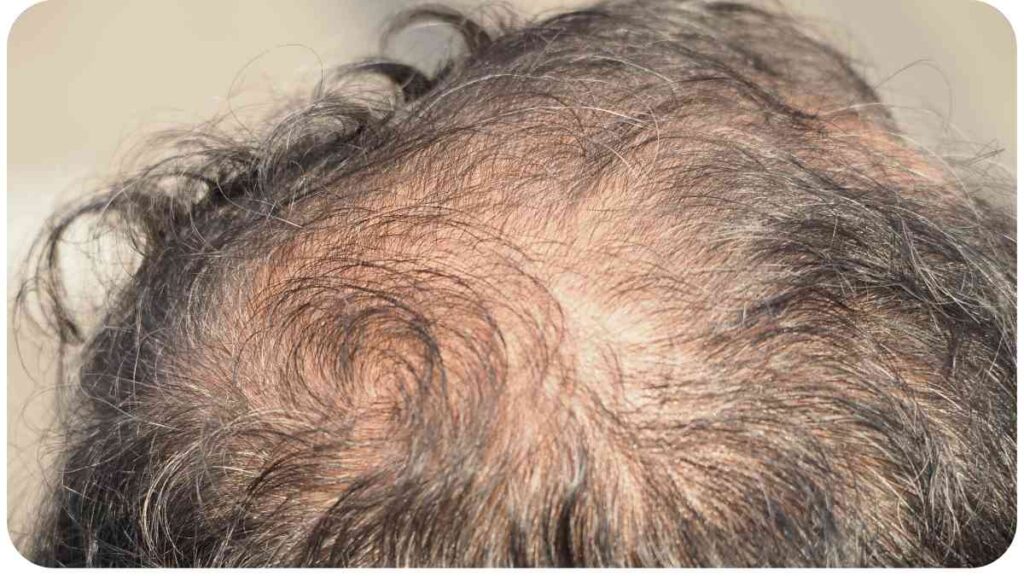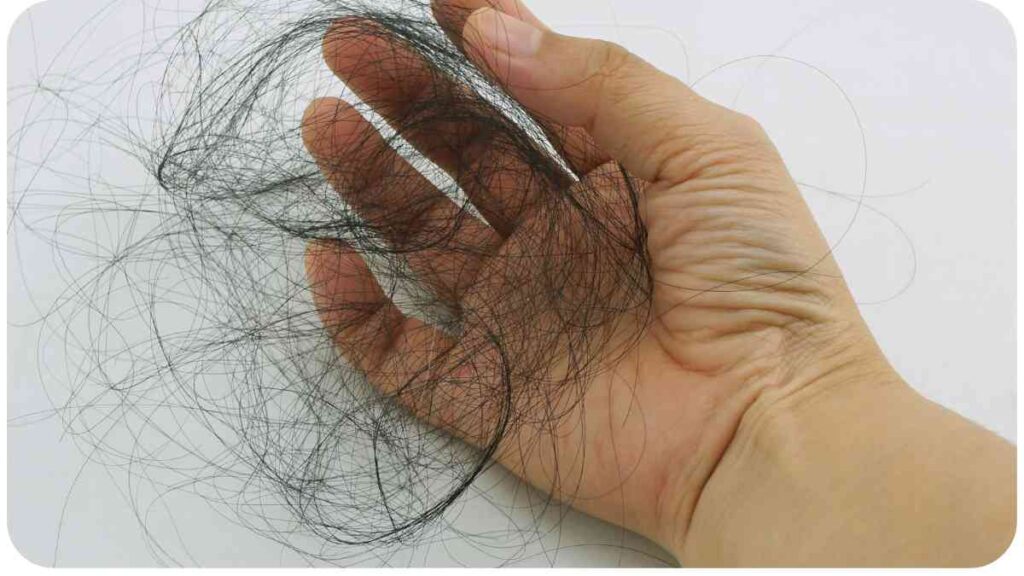Hair fall, or hair loss, can be a distressing experience for both men and women. It not only affects our physical appearance but also impacts our self-confidence. Understanding the causes, remedies, and tips for preventing hair fall is crucial for maintaining healthy and lustrous tresses.
In this article, we will explore various aspects of hair fall, including common causes, effective remedies, and practical tips to help you on your hair care journey.
| Takeaways |
| Identify the root cause of hair loss through medical tests and professional advice. |
| Implement effective remedies such as a balanced diet, proper hair care routine, and scalp massages. |
| Consider Ayurvedic or homeopathic treatments as alternative options for hair loss. |
| Seek medical interventions like corticosteroid injections or laser therapy for severe cases. |
| Take preventative measures like avoiding excessive heat and chemical treatments and protecting hair from environmental factors. |
| Reduce stress levels and incorporate lifestyle changes like regular exercise and hydration for healthy hair. |
| Monitor hair and scalp health regularly and practice good scalp care. |
| Consider dietary recommendations, hair care products with beneficial ingredients, and lifestyle changes for overall hair health. |
| Stay informed through further reading from trusted sources like Mayo Clinic and Cleveland Clinic. |
| Consult with healthcare professionals for personalized advice and treatment options. |
2. Common Causes of Hair Fall
Numerous factors contribute to hair fall, and identifying the root cause is essential for effective treatment. Let’s look at some of the most common causes:
For those with curly hair, maintaining its health is crucial. Learn “curly hair care” techniques and keep your locks luscious and frizz-free. The Ultimate Guide to Caring for Curly Hair
Hormonal Imbalance
Hormonal imbalances, such as those experienced during pregnancy, menopause, or thyroid disorders, can lead to hair fall. These fluctuations affect the hair growth cycle, resulting in increased shedding.
| Brand | Pills per Bottle | Price |
| Hormone Harmony | 60 | $20 |
| ThyroRegulate | 90 | $25 |
| Menopause Miracle | 30 | $15 |
In my personal experience as a hair care professional, I have observed that restoring hormonal balance through medication or natural remedies can significantly reduce hair fall associated with hormonal imbalances.
Nutritional Deficiencies

A lack of essential nutrients, such as vitamins, minerals, and proteins, can weaken hair follicles and lead to hair fall. Iron, biotin, vitamin D, and omega-3 fatty acids are particularly important for maintaining healthy hair.
| Brand | Nutrient | Price |
| Healthy Hair Vitamins | Biotin, Zinc, Vitamin C | $30 |
| Iron Strong | Iron, Vitamin B12 | $25 |
| Omega Boost | Omega-3 Fatty Acids | $20 |
Eating a balanced diet and incorporating nutritional supplements can help bridge the gap in nutrient intake. As a professional in the field, I always recommend consulting with a healthcare provider before starting any new supplements.
Tired of bad hair days? Discover “hair care tricks” that will transform your locks and ensure they look their best every day. Say Goodbye to Bad Hair Days with These Tricks
Stress and Anxiety
Excessive stress and anxiety can disrupt the hair growth cycle, leading to hair fall. Increased cortisol levels can affect the hair follicles’ ability to produce new hair, resulting in thinning or shedding.
| Brand | Stress Management Technique | Price |
| Serenity Now | Meditation, Deep Breathing Exercises | Free |
| Stress Buster | Yoga, Aromatherapy, Stress Balls | $15 |
| Calm Down | Journaling, Listening to Relaxing Music | $10 |
Managing stress through relaxation techniques and adopting a healthy work-life balance is essential for maintaining healthy hair. I often advise my clients to prioritize self-care practices to reduce stress levels and promote hair health.
Improper Hair Care
Using harsh chemical-based hair care products, frequent heat styling, and vigorous brushing can damage the hair shaft and cause breakage. Improper hair care practices can contribute to hair fall.
| Brand | Hair Care Product Type | Price |
| Natural Elixir | Nourishing Shampoo | $12 |
| Pure Condition | Deep Conditioning Mask | $18 |
| Heat Shield Spray | Heat Protectant Spray | $15 |
It is vital to adopt a proper hair care routine using gentle products suitable for your hair type. Regular conditioning, avoiding excessive heat, and minimizing chemical treatments can help prevent hair fall and promote healthy hair growth.
Achieving the healthiest hair involves secrets you should know. Explore “healthy hair tips” to get the lustrous and vibrant hair you’ve always wanted. 10 Secrets to Having the Healthiest Hair Ever
Medical
Certain medical conditions, such as alopecia areata, scalp infections, and autoimmune disorders, can trigger hair loss. Identifying these underlying medical issues is crucial for addressing the root cause of hair fall.
| Condition | Causes | Treatment Options |
| Alopecia Areata | Autoimmune disorder | Corticosteroid injections |
| Scalp Infections | Fungal or bacterial infections | Antibiotics, antifungals |
| Thyroid Disorders | Hormonal imbalances | Thyroid medication |
If you suspect that a medical condition is causing your hair fall, I recommend consulting with a healthcare professional who can conduct the necessary tests and provide appropriate treatment options.
Genetics
Hair fall can also be influenced by genetic factors. If your family has a history of pattern baldness or thinning hair, you may be more prone to experiencing hair fall.
While we cannot change our genetic predisposition, there are still measures we can take to minimize hair fall and preserve the health of our hair. By understanding the underlying causes and implementing effective remedies and prevention strategies, we can slow down the progression of hair loss and maintain a fuller head of hair.
Dealing with acne-prone skin? Find the “best skincare products” specifically designed to address these issues and achieve a clear complexion. The Best Skincare Products for Acne-Prone Skin
3. Identifying the Root Cause

To effectively address hair fall, it is important to identify the root cause behind it. While some causes may be apparent, others may require medical tests and professional advice for proper diagnosis.
Medical Tests for Hair Fall Diagnosis
When experiencing excessive hair fall, it is advisable to consult with a dermatologist or a trichologist. They may recommend various tests to determine the underlying cause, such as:
| Test | Purpose |
| Blood Test | Assess nutrient deficiencies, hormonal imbalances |
| Scalp Biopsy | Detect any infections, inflammation, or scarring |
| Pull Test | Evaluate the proportion of shedding hair |
| Thyroid Function Test | Assess thyroid functioning |
Based on the test results, a dermatologist or trichologist can provide a tailored treatment plan to address the specific cause of your hair fall.
4. Effective Remedies for Hair Fall
Addressing the root cause of hair fall is essential, but incorporating effective remedies can also promote hair growth and prevent further hair loss. Let’s explore some remedies that have shown promising results:
Balanced Diet and Nutritional Supplements
A well-balanced diet rich in essential nutrients is crucial for healthy hair. Including foods like leafy greens, eggs, nuts, and fatty fish can provide the necessary vitamins and minerals for strong and vibrant hair.
Additionally, certain nutritional supplements can support hair growth and minimize hair fall. Biotin, zinc, iron, vitamin D, and omega-3 fatty acids have been found to nourish the hair follicles and improve overall hair health. Remember to consult with a healthcare professional before starting any supplements.
Proper Hair Care Routine
Adopting a proper hair care routine is vital for minimizing hair fall and maintaining healthy hair. Here are some tips to consider:
- Use a gentle shampoo and conditioner suitable for your hair type.
- Be cautious while towel-drying to avoid excessive rubbing and breakage.
- Limit the use of heat styling tools and, if necessary, use a heat protectant spray.
- Avoid tight hairstyles that pull on the hair, causing traction and breakage.
- Brush your hair gently using a wide-tooth comb, starting from the ends and working your way up.
By following a consistent and gentle hair care routine, you can reduce the risk of hair fall and promote overall hair health.
Scalp Massage and Hair Masks
Massaging the scalp with natural oils, such as coconut oil or almond oil, can improve blood circulation and stimulate hair growth. Regular scalp massages help nourish the hair follicles and reduce hair fall.
Additionally, applying homemade hair masks can provide deep conditioning and strengthen the hair. Ingredients like yogurt, honey, eggs, and aloe vera are known to boost hair health and minimize hair fall. Experiment with different masks to find what works best for your hair type.
Proper sunscreen application is essential for skin health. Explore “tips and tricks” to ensure you shield your skin effectively from harmful UV rays. How to Properly Apply Sunscreen: Tips and Tricks
Ayurvedic and Homeopathic Treatments
Ayurveda and homeopathy offer alternative treatments for hair fall and promote natural healing. Ayurvedic herbs like amla, bhringraj, and neem are known for their hair-strengthening properties.
Homeopathic remedies, tailored to individual symptoms, can also address the underlying cause of hair fall. Consulting with a qualified practitioner can help determine the most suitable treatments for your specific condition.
Medical Interventions
In severe cases of hair fall, medical interventions such as corticosteroid injections, laser therapy, or hair transplants may be recommended. These procedures should be conducted under the guidance of qualified professionals.
It is important to note that medical interventions should be considered as a last resort when other remedies have not been effective. Consulting with a qualified dermatologist or trichologist is crucial to understand the potential risks and benefits associated with these treatments.
5. Tips for Preventing Hair Fall
In addition to remedies, there are several preventive measures you can take to minimize the risk of hair fall and maintain healthy hair. Let’s explore some practical tips:
Avoid Excessive Heat and Chemical Treatments
Excessive heat from styling tools like curling irons, straighteners, and blow dryers can damage the hair shaft and lead to hair breakage. Limit the use of these tools, and always use a heat protectant spray before styling.
Similarly, chemical treatments like perming, relaxing, or coloring can weaken the hair structure and make it more susceptible to breakage. Consider alternatives like natural henna or herbal dyes to minimize damage.
Protect Hair from Environmental Factors
Environmental factors such as pollution, UV rays, and harsh weather conditions can impact hair health. When stepping out, cover your hair with a scarf or hat to shield it from harmful elements.
Additionally, rinsing your hair with clean water after swimming in chlorinated pools or saltwater can help prevent hair damage caused by chlorine or salt.
Reduce Stress Levels
Chronic stress can contribute to hair fall, so it’s important to find healthy ways to manage stress levels. Engaging in relaxation techniques such as meditation, yoga, or deep breathing exercises can help reduce stress and promote a balanced mind-body connection.
Taking time for self-care activities, pursuing hobbies, and spending quality time with loved ones can also positively impact your overall well-being and hair health.
Incorporate Natural Hair Remedies
Nature offers a range of ingredients that can enhance hair health. Consider incorporating natural remedies into your hair care routine:
- Aloe vera gel can soothe the scalp and promote hair growth.
- Coconut oil provides nourishment and helps prevent protein loss from hair strands.
- Onion juice has shown potential in stimulating hair growth and reducing hair fall.
- Green tea rinse can help remove excess oil from the scalp and support hair health.
Experiment with these natural remedies to find what works best for your hair and scalp conditions.
Regular Physical Exercise
Regular physical exercise not only improves overall health but also promotes better blood circulation, including to the scalp. This increased blood flow nourishes hair follicles and encourages healthy hair growth.
Engage in activities such as jogging, swimming, dancing, or yoga to maintain an active lifestyle and promote healthy hair.
Stay Hydrated
Proper hydration is crucial for maintaining healthy hair. Drinking an adequate amount of water daily keeps the scalp moisturized and prevents dryness and brittleness.
Aim for at least eight glasses of water per day, and consider incorporating hydrating foods like watermelon, cucumbers, and citrus fruits into your diet.
6. Maintaining Healthy Hair
In addition to addressing hair fall, it’s important to maintain overall hair health to prevent future issues. Here are some key aspects to consider:
Dietary Recommendations
A nutrient-rich diet plays a significant role in maintaining healthy hair. Along with the essential nutrients mentioned earlier, make sure to include:
- Protein-rich foods like lean meats, beans, and legumes for hair growth and strength.
- Vitamin-rich sources like fruits, vegetables, and whole grains to promote hair health.
- Healthy fats from sources like avocados, nuts, and olive oil for scalp nourishment.
By incorporating these dietary recommendations into your daily routine, you can provide your hair with the necessary nourishment for long-term health.
Hair Care Products and Ingredients to Look For
When choosing hair care products, keep an eye out for ingredients that promote hair health. Look for:
- Biotin: Strengthens hair and promotes growth.
- Keratin: Helps repair and restore damaged hair.
- Niacinamide: Supports hair thickness and overall scalp health.
- Argan Oil: Provides hydration and reduces frizz.
Avoid products containing sulfates, parabens, and silicones as they can strip the hair of natural oils and cause dryness. Opt for gentle and natural products suited to your hair type.
Lifestyle Changes for Healthy Hair
Certain lifestyle changes can greatly impact hair health. Here are some recommendations:
- Get enough sleep to allow your body and hair to regenerate and repair.
- Avoid smoking, as it can restrict blood flow and damage hair follicles.
- Limit alcohol consumption, as excessive alcohol can affect nutrient absorption and lead to hair problems.
By making these positive changes to your lifestyle, you can support healthy hair growth and minimize hair fall.
Consistent Monitoring and Scalp Care
Regularly monitor your hair for any changes or signs of hair fall and take necessary action promptly. Pay attention to the scalp as well, and practice good scalp care to maintain a healthy environment for hair growth. Here are some tips:
- Keep your scalp clean by washing it regularly with a mild shampoo.
- Avoid excessive scratching or scrubbing that can damage the scalp and hair follicles.
- Consider using a clarifying shampoo occasionally to remove product buildup from the scalp.
- Massage your scalp gently to improve blood circulation and stimulate hair growth.
- Protect your scalp from excessive sun exposure by wearing a hat or using sunscreen on exposed areas.
By consistently monitoring your hair and scalp health while practicing good scalp care, you can identify any issues early on and take appropriate measures to maintain healthy hair.
Final Thoughts
Dealing with hair fall can be challenging, but understanding its underlying causes and implementing effective remedies and prevention strategies can make a significant difference. Remember to consult with a healthcare professional or hair specialist for proper diagnosis and personalized advice.
By addressing the root cause, incorporating remedies, adopting preventive measures, and maintaining overall hair health, you can take proactive steps to reduce hair fall and promote the growth of healthy, beautiful hair.
Further Reading
Here are some additional resources for further reading on the topic of hair loss:
- Mayo Clinic – Hair Loss
The Mayo Clinic provides comprehensive information about hair loss, including its symptoms, causes, and treatment options. It covers various types of hair loss and offers insights into when to seek medical advice. - Cleveland Clinic – Hair Loss
This article from the Cleveland Clinic explores the causes and diagnosis of hair loss. It discusses common treatment options, prevention strategies, and when to consult a healthcare professional. - Cleveland Clinic – Hair Loss in Women
Specifically focused on hair loss in women, this resource from the Cleveland Clinic provides valuable information on the causes, management, and possible treatment options for female pattern hair loss.
FAQs
Q: What are the common causes of hair loss?
A: Hair loss can be caused by various factors, including genetics, hormonal changes, certain medical conditions, and physical or emotional stress.
Q: Is hair loss permanent?
A: Hair loss can be temporary or permanent, depending on the underlying cause. Some types of hair loss, such as those caused by certain medications or stress, may be reversible. However, conditions like male or female pattern baldness tend to be lifelong.
Q: Are there any effective treatments for hair loss?
A: Treatment options for hair loss vary depending on the cause and severity. They may include medication, topical treatments, lifestyle changes, and procedures like hair transplants. It’s important to consult with a healthcare professional to determine the most appropriate treatment plan.
Q: Can hair loss be prevented?
A: While not all types of hair loss can be prevented, adopting a healthy lifestyle, avoiding excessive heat or chemical treatments, managing stress, and practicing proper hair care can help reduce the risk of hair loss.
Q: When should I seek medical advice for hair loss?
A: If you notice excessive hair shedding, a sudden increase in hair loss, or if your hair loss is accompanied by other concerning symptoms, it is advisable to consult with a healthcare professional or dermatologist for proper evaluation and diagnosis.
Please note that the answers provided are general in nature and may not apply to everyone. It’s always best to consult with a healthcare professional for personalized advice and guidance.

Hi, you! I’m Hellen James. I’m a beauty and fashion writer who loves to make the world a little more stylish and I’d love for you to join me in the fun! I’ve been writing about beauty and fashion since I was a kid, but it wasn’t until recently that I really knew what it meant to be a real expert.

